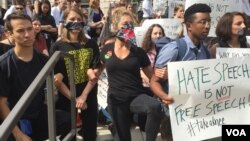U.S. Attorney General Jeff Sessions scolded American universities Tuesday for violating students' free speech rights, in an address at Georgetown University that was protested by dozens of students and faculty members and thrust the controversial federal official into a hot-button issue.
“Freedom of thought and freedom of speech on the American campus are under attack,” Sessions said. “Whereas the American university was once the center of academic freedom – a place of robust debate, a forum for the competition of ideas – it is transforming into an echo chamber of political correctness and homogenous thought, a shelter for fragile egos.”
Sessions' remarks at the Georgetown Center for the Constitution came amid debate on college campuses over controversial speakers who have drawn sometimes violent protests. Some schools have canceled speeches over safety concerns, drawing criticism from free-speech advocates who say universities are places that should not shy away from controversial debates.
Sessions took universities to task for employing a host of measures to stifle free speech, including enshrining speech codes that dictate accepted speech on campus, setting up “free speech zones” for protesters - “an area barely the size of a couple of college dorm rooms” - and using the so-called “heckler’s veto,” or threat of a protest, to screen out speakers.
“In these instances, administrators discourage or prohibit speech if there is even a threat that it will be met with protest,” Sessions said.
The speech came just days after former FBI Director James Comey was heckled during a speech at Howard University in Washington, as he made his first public appearance since being fired by President Donald Trump in May.
School protests
There was no heckling or jeering during the Sessions speech. The audience was friendly, pre-selected by the center. In a display of silent protest, however, a group of 10 protesters sitting in a back row, dressed in black and their mouths covered with duct tape, stood up and sat down as Sessions wrapped up his speech.
Outside, on the steps of McDonough Hall, more than 100 students and faculty members gathered to stage a loud protest, speaking into bullhorns and carrying signs that read “Hate Speech is Not Free Speech,” “Sessions Suppression,” and “Free Speech cannot be limited to a designated Area.”
The university had initially designated a “free speech zone” for the protesters far from the building but later allowed the group to assemble outside McDonough Hall.
The demonstration started off as an outcry over Georgetown's decision to invite Sessions to the campus, but veered into a broader protest over the school's free-speech policies after a group of students were excluded from the event.
In a statement released on Monday, a group of Georgetown law faculty members said that while they acknowledged Sessions’ right to speak, he was not the right person for the subject.
“Attorney General Sessions is a key Cabinet member in an administration headed by a president who spent last weekend denouncing athletes engaged in free expression,” the group said in a statement issued on Monday.
Last weekend, Trump denounced professional football players for kneeling in protest during performances of the national anthem before games. The president said they should be fired for disrespecting the flag and the country.
Sessions defended Trump’s comments during this speech: “These players, with all the assets they have, can express their political views without in effect denigrating the symbols of our nation, a nation that has provided our freedom to speak.”
University free speech policies
Other protesters directed their ire at the university for barring nearly 130 students from attending Sessions speech.
“We, the disinvited, find it extraordinarily hypocritical that AG Sessions would lecture future attorneys about free speech on campus while excluding the wider student body,” said law student Ambur Smith.
University officials said the students should not have indicated they were planning to attend, because they were not on the center’s guest list.
“The invitation was non-transferable, so those students were notified of the error by email,” said Tanya Weinberg, director of media relations for the Georgetown Law Center.
Some protesters said they felt the university wanted to ensure a friendly audience for the attorney general.
“Sessions was in a space where he was only surrounded by people who agreed with him, and he did not create a space for any dissenting voices,” said law student and protest organizer Lauren Phillips.
Weinberg rejected the claim.
“I would point out that students within the auditorium expressed themselves in protest,” she said, referring to the group of silent protesters inside the lecture hall.
Georgetown, the nation's oldest Roman Catholic and Jesuit university, has been in the hot water over its free-speech policies before. The school has for years refused to recognize a student group whose members are "pro-choice" - in favor of abortion rights for women.
Robert Shibley, executive director of the Foundation for Individual Rights in Education, said Georgetown “does not have a great record on free speech."
Shibley applauded Sessions’ announcement that the Department of Justice would support students suing universities in an attempt to overturn violations of free-speech rights on campuses.
“We’re glad to see the department taking an interest in making sure our Constitution is respected,” Shibley said.
DOJ said Tuesday it has filed a so-called statement of support for a student who has sued Georgia Gwinnett College, part of the public university system in the southern state of Georgia. The student argues that his rights were violated when administrators limited where he could preach about Christianity on campus.




